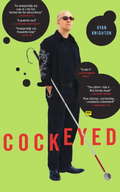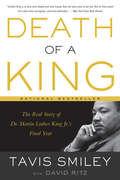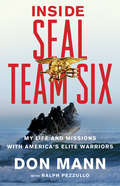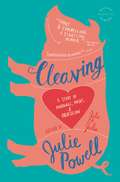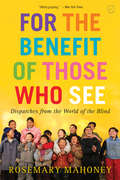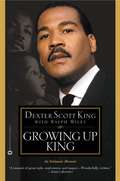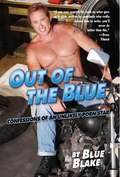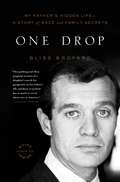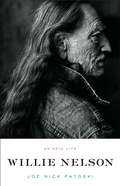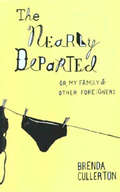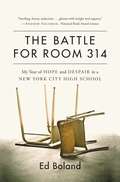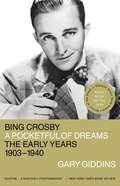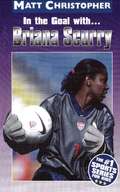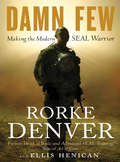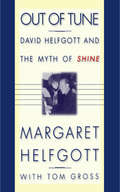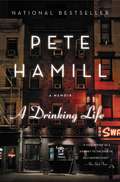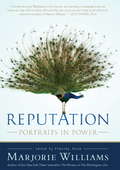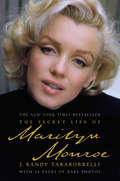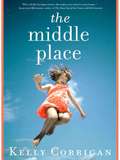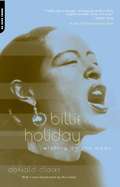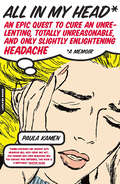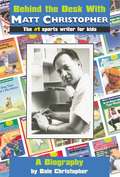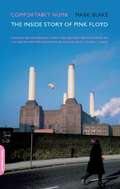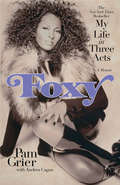- Table View
- List View
Cockeyed
by Ryan KnightonThis irreverent, tragicomic, politically incorrect, astoundingly articulate memoir about going blind?and growing up?illuminates not just the author's reality, but the reader's.
Death of a King: The Real Story of Dr. Martin Luther King Jr.'s Final Year
by David Ritz Tavis SmileyA revealing and dramatic chronicle of the twelve months leading up to Dr. Martin Luther King, Jr.'s assassinationMartin Luther King, Jr. died in one of the most shocking assassinations the world has known, but little is remembered about the life he led in his final year. New York Times bestselling author and award-winning broadcaster Tavis Smiley recounts the final 365 days of King's life, revealing the minister's trials and tribulations -- denunciations by the press, rejection from the president, dismissal by the country's black middle class and militants, assaults on his character, ideology, and political tactics, to name a few -- all of which he had to rise above in order to lead and address the racism, poverty, and militarism that threatened to destroy our democracy.Smiley's DEATH OF A KING paints a portrait of a leader and visionary in a narrative different from all that have come before. Here is an exceptional glimpse into King's life -- one that adds both nuance and gravitas to his legacy as an American hero.
Inside SEAL Team Six: My Life and Missions with America's Elite Warriors
by Don MannThe Inside Story of America's Ultimate Warriors. When Osama bin Laden was assassinated, the entire world was fascinated by the men who had completed the seemingly impossible mission that had dogged the U.S. government for over a decade. SEAL Team 6 became synonymous with heroism, duty, and justice. Only a handful of the elite men who make up the SEALs, the US Navy's best and bravest, survive the legendary and grueling selection process that leads to becoming a member of Team 6, a group so classified it technically does not even exist. There are no better warriors on Earth. Don Mann knows what it takes to be a brother in this ultra-selective fraternity. As a member of Seal Team Six for over eight years and a SEAL for over seventeen years, he worked in countless covert operations, operating from land, sea, and air, and facing shootings, decapitations, and stabbings. He was captured by the enemy and lived to tell the tale, and he participated in highly classified missions all over the globe, including Somalia, Panama, El Salvador, Colombia, Afghanistan, and Iraq. As a coordinator for several civilian SEAL training programs, and as a former Training Officer of SEAL Team Six, he was directly responsible for shaping the bodies and minds of SEALs who carried out the assassination of Osama bin Laden. But to become a SEAL, Mann had to overcome his own troubled childhood and push his body to its breaking point--and beyond. INSIDE SEAL TEAM 6 is a high octane narrative of physical and mental toughness, giving unprecedented insight to the inner workings of the training and secret missions of the world's most respected and feared combat unit.
Cleaving: A Story of Marriage, Meat, and Obsession
by Julie PowellJulie Powell thought cooking her way through Julia Child's Mastering the Art of French Cooking was the craziest thing she'd ever do--until she embarked on the voyage recounted in her new memoir, CLEAVING. Her marriage challenged by an insane, irresistible love affair, Julie decides to leave town and immerse herself in a new obsession: butchery. She finds her way to Fleischer's, a butcher shop where she buries herself in the details of food. She learns how to break down a side of beef and French a rack of ribs--tough, physical work that only sometimes distracts her from thoughts of afternoon trysts. The camaraderie at Fleischer's leads Julie to search out fellow butchers around the world--from South America to Europe to Africa . At the end of her odyssey, she has learned a new art and perhaps even mastered her unruly heart.
For the Benefit of Those Who See: Dispatches from the World of the Blind
by Rosemary Mahoney<P>"In this intelligent and humane book, Rosemary Mahoney writes of people who are blind....She reports on their courage and gives voice, time and again, to their miraculous dignity."--Andrew Solomon, author of Far From the Tree <P>In the tradition of Oliver Sacks's The Island of the Colorblind, Rosemary Mahoney tells the story of Braille Without Borders, the first school for the blind in Tibet, and of Sabriye Tenberken, the remarkable blind woman who founded the school. Fascinated and impressed by what she learned from the blind children of Tibet, Mahoney was moved to investigate further the cultural history of blindness. <P>As part of her research, she spent three months teaching at Tenberken's international training center for blind adults in Kerala, India, an experience that reveals both the shocking oppression endured by the world's blind, as well as their great resilience, integrity, ingenuity, and strength. <P>By living among the blind, Rosemary Mahoney enables us to see them in fascinating close up, revealing their particular "quality of ease that seems to broadcast a fundamental connection to the world." Having read FOR THE BENEFIT OF THOSE WHO SEE, you will never see the world in quite the same way again.
Growing Up King: An Intimate Memoir
by Dexter Scott King Ralph WileyHe was just seven years old and watching television in the family's den when a special news bulletin announced that his father had fallen to an assassin's bullet -- a tragedy that would forever scar his adolescence. But as an adult, Dexter Scott King was determined to confront the past, discover the truth about his father's murder, and protect his father's legacy... To a divided country, Martin Luther King, Jr., was a leader who represented shining hope. Yet to his youngest son, Dexter, he was a gentle father who joyfully played with his children. Then the civil rights leader was brutally assassinated...and Dexter found his family's life irrevocably shattered. Burdened by wrenching grief and tremendous expectations, Dexter eventually triumphed over both by proving in a civil jury trial that there was a conspiracy involving governmental agencies to kill his father. Poignant and bracingly candid, GROWING UP KING is an intimate portrait of an unforgettable hero, a loving son, and the unbreakable bond between them. Book jacket.
Out of the Blue: Confessions of an Unlikely Porn Star
by Blue BlakeOut of the Blue is a hilarious autobiographical romp that details the life of porn star turned director/producer Blue Blake and his adventures in the skin trade. Blue has worked with every major star in the industry and won many major awards and honors, including induction into the Gay Porn Legend Hall of Fame.
One Drop: My Father's Hidden Life--A Story of Race and Family Secrets
by Bliss BroyardTwo months before he died of cancer, renowned literary critic Anatole Broyard called his grown son and daughter to his side, intending to reveal a secret he had kept all their lives and most of his own: he was black. But even as he lay dying, the truth was too difficult for him to share, and it was his wife who told Bliss that her WASPy, privileged Connecticut childhood had come at a price. Ever since his own parents, New Orleans Creoles, had moved to Brooklyn and began to "pass" in order to get work, Anatole had learned to conceal his racial identity. As he grew older and entered the ranks of the New York literary elite, he maintained the façade. Now his daughter Bliss tries to make sense of his choices and the impact of this revelation on her own life. She searches out the family she never knew in New York and New Orleans, and considers the profound consequences of racial identity. With unsparing candor and nuanced insight, Broyard chronicles her evolution from sheltered WASP to a woman of mixed race ancestry.
Willie Nelson: An Epic Life
by Joe Nick PatoskiFrom his first performance at age four, Willie Nelson was driven to make music and live life on his own terms. But though he is a songwriter of exceptional depth - "Crazy" was one of his early classics - Willie only found success after abandoning Nashville and moving to Austin, Texas.Red Headed Stranger made country cool to a new generation of fans. Wanted: The Outlaws became the first country album to sell a million copies. And "On the Road Again" became the anthem for Americans on the move. A craggy-faced, pot-smoking philosopher, Willie Nelson is one of America's great iconoclasts and idols.Now Joe Nick Patoski draws on over 100 interviews with Willie and his family, band, and friends to tell Nelson's story, from humble Depression-era roots, to his musical education in Texas honky-tonks and his flirtations with whiskey, women, and weed; from his triumph with #1 hit "Always On My Mind" to his nearly career-ending battles with debt and the IRS; and his ultimate redemption and ascension to American hero
The Nearly Departed: Or my family & other foreigners
by Brenda CullertonCullerton's parents were always eccentric. Her mother gardened in curlers, pop beads, and black satin underpants, while her father hid wads of cash in shoes in the garage. This is a haunting, heartbreaking, and incredibly funny book that is a love letter to parents, family, and home--however strange they may be.
The Battle for Room 314: My Year of Hope and Despair in a New York City High School
by Ed BolandTHE BATTLE FOR ROOM 314In a fit of idealism, Ed Boland left a twenty-year career as a non-profit executive to teach in a tough New York City public high school. But his hopes quickly collided headlong with the appalling reality of his students' lives and a hobbled education system unable to help them: Freddy runs a drug ring for his incarcerated brother; Nee-cole is homeschooled on the subway by her brilliant homeless mother; and Byron's Ivy League dream is dashed because he is undocumented. In the end, Boland isn't hoisted on his students' shoulders and no one passes AP anything. This is no urban fairy tale of at-risk kids saved by a Hollywood hero, but a searing indictment of schools that claim to be progressive but still fail their students. Told with compassion, humor, and a keen eye, Boland's story is sure to ignite debate about the future of American education and attempts to reform it.
Bing Crosby: A Pocketful of Dreams, The Early Years 1903 - 1940
by Gary GiddinsFrom 1934 to 1954, Bing Crosby utterly dominated North American entertainment. Nobody has ever had as many hit records, and Crosby was the number one movie star five years in a row. The rise of Bing Crosby was the rise of North American popular culture itself. In Bing Crosby, the first volume of the definitive Crosby biography, award-winning music critic Gary Giddins chronicles the ascension of Bing's career. From Crosby's early recordings, to his triumph on Americas most popular radio show, to his first success in Hollywood, Giddins provides the most detailed study yet of the rise of a North American star. This is the first definitive biography of Crosby and was written with exclusive access to unpublished materials. Giddins Visions of Jazz won the 1998 National Book Critics Circle Award. Bing Crosby was the first North American pop culture icon, and his career heavily influenced Sinatra and Elvis, as well as popular music itself.
In the Goal With…Briana Scurry (Sports Bio Bookshelf)
by Matthew F ChristopherOn July 10, 1999, at the end of 90 minutes of regulation play plus two 15 minute overtime periods, Briana Scurry faced the greatest challenge of her soccer career. As goalkeeper for the U. S. Women's national team, she would be squaring off against China's best five penalty kickers in a shootout that would determine the winners of the 1999 Women's World Cup. The pressure was enormous -- but Briana Scurry thrives on pressure, which is one reason she's been called the best goalkeeper in the world. Since 1994, she has proven again and again that when the heat's on, she'll stay cool. And that's just what she did that steamy July day . . .
Damn Few: Making the Modern SEAL Warrior
by Ellis Henican Rorke DenverFrom leadership expert, former Navy SEAL, "American Grit" feature player, and author of Worth Dying For: A Navy SEAL's Call to a Nation, Rorke Denver, the bestselling account of how he helped create the U.S. Navy SEALS of today. Rorke Denver trains the men who become Navy SEALs--the most creative problem solvers on the modern battlefield, ideal warriors for the kinds of wars America is fighting now. With his years of action-packed mission experience and a top training role, Lieutenant Commander Denver understands exactly how tomorrow's soldiers are recruited, sculpted, motivated, and deployed.Now, Denver takes you inside his personal story and the fascinating, demanding SEAL training program he now oversees. He recounts his experience evolving from a young SEAL hopeful pushing his way through Hell Week, into a warrior engaging in dangerous stealth missions across the globe, and finally into a lieutenant commander directing the indoctrination, requalification programs, and the "Hero or Zero" missions his SEALs undertake.From his own SEAL training and missions overseas, Denver details how the SEALs' creative operations became front and center in America's War on Terror-and how they are altering warfare everywhere. In fourteen years as a SEAL officer, Rorke Denver tangled with drug lords in Latin America, stood up to violent mobs in Liberia, and battled terrorists in Iraq and Afghanistan. Leading 200 commando missions, he earned the Bronze Star with V for valor. He has also served as flag aide to the admiral in charge and spent the past four years as executive officer of the Navy Special Warfare Center's Advanced Training Command in Coronado, California, directing all phases of the basic and advanced training that prepare men for war in SEAL teams. He recently starred in the film Act of Valor. He is married and has two daughters.Ellis Henican is a columnist at Newsday and an on-air commentator at the Fox News Channel. He has written two recent New York Times bestsellers, Home Team with New Orleans Saints coach Sean Payton and In the Blink of an Eye with NASCAR legend Michael Waltrip.With all the SEALs' recent successes, we have been getting a level of acclaim we're not used to. But something important has been missing in this warm burst of publicity . Correcting that is my mission here.My own SEAL dream was launched by a book. My hope is that this one teaches lessons that go far beyond the battlefield, inspiring a fresh generation of warriors to carry on that dream.-Lieutenant Commander Rorke Denver
Out of Tune: David Helfgott and the Myth of Shine
by Margaret Helfgott Tom Gross"The Academy Award winning film Shine made pianist David Helfgott a household name. While purporting to be a true story, the movie is actually full of fabrications. Now for the first time, Margaret, David Helfgott's eldest sister, who knows him better than anyone from their early years, sets the record straight. Dispelling the many untruths propagated by the movie, Margaret tells the real story of her extraordinary brother, of a life, a career, and a legacy that will remain forever... Out Of Tune."--BOOK JACKET. Title Summary field provided by Blackwell North America, Inc. All Rights Reserved.
A Drinking Life: A Memoir
by Pete HamillRugged prose and a rare attention to telling detail have long distinguished Pete Hamill's unique brand of journalism and his universally well received fiction. Twenty years after his last drink, he examines the years he spent as a full-time member of the drinking culture. The result is A Drinking Life, a stirring and exhilarating memoir float is his most personal writing to date. The eldest son of Irish immigrants, Hamill learned from his Brooklyn upbringing during the Depression and World War II that drinking was an essential part of being a man; he only had to accompany his father up the street to the warm, amber-colored world of Gallagher's bar to see that drinking was what men did. It played a crucial role in mourning the death of relatives or the loss of a job, in celebrations of all kinds, even in religion. In the navy and the world of newspapers, he learned that bonds of friendship, romance, and professional camaraderie were sealed with drink. It was later that he discovered that drink had the power to destroy those very bonds and corrode any writer's most valuable tools: clarity, consciousness, memory. It was almost too late when he left drinking behind forever. Neither sentimental nor self-righteous, this is a seasoned writer's vivid portrait of the first four decades of his life and the slow, steady way that alcohol became an essential part of that life. Along the way, he summons the mood of a time and a place gone forever, with the bittersweet fondness of a lifetime New Yorker. It is his best work yet.
Reputation: Portraits in Power
by Majorie WiliiamsFrom the author of the "New York Times" bestseller "The Woman at the Washington Zoo," a stunning collection of political portraits from the final dozen years of the twentieth century
Taboo: Why Black Athletes Dominate Sports And Why We're Afraid To Talk About It
by Jon EntineDrawing on the latest scientific research, journalist Jon Entine makes an irrefutable case for black athletic superiority. We learn how scientists have used numerous, bogus scientific methods to prove that blacks were either more or less superior physically, and how racist scientists have often equated physical prowess with intellectual deficiency. Entine recalls the long, hard road to integration, both on the field and in society. And he shows why it isn't just being black that matters?it makes a huge difference as to where in Africa your ancestors are from.
The Secret Life of Marilyn Monroe
by J. Randy TaraborrelliFrom New York Times bestselling author J. Randy Taraborrelli comes the definitive biography of the most enduring icon in popular American culture. When Marilyn Monroe became famous in the 1950s, the world was told that her mother was either dead or simply not a part of her life. However, that was not true. In fact, her mentally ill mother was very much present in Marilyn's world and the complex family dynamic that unfolded behind the scenes is a story that has never before been told...until now. In this groundbreaking book, Taraborrelli draws complex and sympathetic portraits of the women so influential in the actress' life, including her mother, her foster mother, and her legal guardian. He also reveals, for the first time, the shocking scope of Marilyn's own mental illness, the identity of Marilyn's father and the half-brother she never knew, and new information about her relationship with the Kennedy's-Bobby, Jack, and Pat Kennedy Lawford. Explosive, revelatory, and surprisingly moving, this is the final word on the life of one of the most fascinating and elusive icons of the 20th Century.
The Middle Place
by Kelly CorriganFor Kelly Corrigan, family is everything. At thirty-six, she had a marriage that worked, two funny, active kids, and a weekly newspaper column. But even as a thriving adult, Kelly still saw herself as the daughter of garrulous Irish-American charmer George Corrigan. She was living deep within what she calls the Middle Place--"that sliver of time when parenthood and childhood overlap"--comfortably wedged between her adult duties and her parents' care. But Kelly is abruptly shoved into coming-of-age when she finds a lump in her breast--and gets the diagnosis no one wants to hear. When George, too, learns that he has late-stage cancer, it is Kelly's turn to take care of the man who had always taken care of her--and to show us a woman who finally takes the leap and grows up. Kelly Corrigan is a natural-born storyteller, a gift you quickly recognize as her father's legacy, and her stories are rich with everyday details. She captures the beat of an ordinary life and the tender, sometimes fractious moments that bind families together. Rueful and honest, Kelly is the prized friend who will tell you her darkest, lowest, screwiest thoughts, and then later dance on the coffee table at your party. Funny yet heart-wrenching, The Middle Place is about being a parent and a child at the same time. It is about the special double-vision you get when you are standing with one foot in each place. It is about the family you make and the family you came from--and locating, navigating, and finally celebrating the place where they meet. It is about reaching for life with both hands--and finding it.
Billie Holiday: Wishing on the Moon
by Donald ClarkeCertainly no singer has been more mythologized and more misunderstood than Billie Holiday, who helped to create much of the mystique herself with her autobiography, Lady Sings the Blues. "Now, finally, we have a definitive biography," said Booklist of Donald Clarke's Billie Holiday, "by a deeply compassionate, respectful, and open-minded biographer [whose] portrait embraces every facet of Holiday's paradoxical nature, from her fierceness to her vulnerability, her childlikeness to her innate elegance and amazing strength. " Clarke was given unrivaled access to a treasure trove of interviews from the 1970s-interviews with those who knew Lady Day from her childhood in the streets and good-time houses of Baltimore through the early days of success in New York and into the years of fame, right up to her tragic decline and death at the age of forty-four. Clarke uses these interviews to separate fact from fiction and, in the words of the Seattle Times, "finally sets us straight. . . evoking her world in all its anguish, triumph, force and irony. " Newsday called this "a thoroughly riveting account of Holiday and her milieu. " The New York Times raved that it "may be the most thoroughly valuable of the many books on Holiday," and Helen Oakley Dance in JazzTimes said, "We should probably have to wait a long time for another life of Billie Holiday to supersede Donald Clarke's achievement. "
All in My Head: An Epic Quest to Cure an Unrelenting, Totally Unreasonable, and Only Slightly Enlightening Headache
by Paula Kamen"All in My Head" is the remarkable story of patience, acceptance, and perseverance in the face of terrifying pain due to a never-ending headache.
Behind the Desk with... Matt Christopher: The #1 Sportswriter for Kids
by Dale ChristopherIn 1954, Matt Christopher wrote and published The Lucky Baseball Bat and has since published more than one hundred twenty novels, making him the most prolific and bestselling sportswriter for children ever. With over 6 million copies sold, Matt's books have a permanent place in the hearts of young sports fans. Throughout 2004, we celebrate 50 years with Matt Christopher's own commemorative biography written by his son, Dale, in the tradition of the Matt Christopher Biography Bookshelf, with exclusive photos, original letters, and memorabilia.
Comfortably Numb: The Inside Story of Pink Floyd
by Mark BlakeMark Blake draws on his own interviews with band members as well as the group's friends, road crew, musical contemporaries, former housemates, and university colleagues to produce a riveting history of one of the biggest rock bands of all time. We follow Pink Floyd from the early psychedelic nights at UFO, to the stadium-rock and concept-album zenith of the seventies, to the acrimonious schisms of the late '80s and '90s. Along the way there are fascinating new revelations about Syd Barrett's chaotic life at the time of Piper at the Gates of Dawn, the band's painstaking and Byzantine recording sessions at Abbey Road, and the fractious negotiations to bring about their fragile, tantalizing reunion in Hyde Park.Meticulous, exacting, and ambitious as any Pink Floyd album, Comfortably Numb is the definitive account of this most adventurous-and most English-rock band.
Foxy: My Life in Three Acts
by Andrea Cagan Pam GrierSome may know her as hot, gutsy, gun-totin' Foxy Brown, Friday Foster, Coffy, and Jackie Brown. Others may know her from her role as Kit Porter on The L Word. But that only defines one part of the legend that is Pam Grier.Foxy is Pam's testimony of her life, past and present. In it, she reveals her relationships with Richard Pryor, Kareem Abdul-Jabbar, and Freddie Prinze Sr., among others. She unveils her experiences as a backup singer and a blaxploitation star. In particularly candid and shocking chapters, she shares-for the first time-her view of those films and the persecution that blacks, especially women, needed to endure to make a name for themselves . . . including how it felt to be labeled one of the most beautiful women alive, yet not be permitted to try on clothes in a department store because of the color of her skin. And in words sure to inspire many, she tells the story of her ongoing battle with cancer. From her disappointments to her triumphs, nothing is held back. With FOXY, Pam wishes to impart life lessons to her readers-and hopes to touch their hearts.
